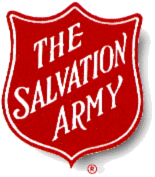July 5: Onward Christian Soldiers
Salvation Army Founded (1865)
 It was on this date, July 5, 1865, that Methodist minister William Booth took his gospel to the streets and began preaching to "undesirables" in London's East End. His ministry combined salvation with practical concern for the needs of homeless and destitute humanity. Booth's mission adopted the name "Salvation Army" in 1878 and also adopted a quasi-military vocabulary and hierarchy.
It was on this date, July 5, 1865, that Methodist minister William Booth took his gospel to the streets and began preaching to "undesirables" in London's East End. His ministry combined salvation with practical concern for the needs of homeless and destitute humanity. Booth's mission adopted the name "Salvation Army" in 1878 and also adopted a quasi-military vocabulary and hierarchy.
At first controversial, because they challenged problems like child labor and the use of alcohol, the Salvation Army is rarely seen except at Christmas, when volunteers ring bells on street corners and in shopping malls to solicit donations for their charitable work. The usually skeptical George Bernard Shaw portrayed the organization approvingly in his 1905 play, Major Barbara, although Shaw did point out the hypocrisy of refusing so-called "tainted" money, money derived from "sinful" sources. Shaw maintained there is no such thing as good money, since it can all be traced back to "crime, drink, prostitution, disease, and all the evil fruits of poverty."
Booth's concept of saving souls while saving bodies caught on well and anticipated many government-run charities throughout the 20th century. What could be wrong with that? The Salvation Army's success has made it a worldwide corporation. It takes in $2 billion per year in the US alone — tax-free. Most of its employees are unpaid "beneficiaries." Because they are not technically "employed," these beneficiaries are not subject to labor laws or occupational safety and health regulations. There is no workman's compensation; the Army does not even pay into the unemployment insurance program, so workers get no benefits if they lose their jobs. There are no unions, health-insurance plans or pensions. "Beneficiaries" get a $5/week spending allowance, but they are required to donate 10% of that to the Army as charity.
Administrative costs account for nearly 90% of the Salvation Army's "income" spending. The Army's holds much real estate, also tax-free. The secular Good Will Industries and Volunteers of America justifiably claim that the Salvation Army is unfair competition. That could only get worse if a "faith-based initiative" takes hold of taxpayers dollars. As a Christian church, the Salvation Army is exempt from many of the regulations and reporting requirements under which other businesses and charities operate. Add to that the back-room political dealing that attempted to allow the Army to discriminate against homosexuals and others in hiring, in exchange for donations and political support, and you have an organization that is a charity in name only: the Salvation Army has become a political organization. So much for William Booth's vision!
The eleven points of the Salvation Army Doctrine are all affirmations of Christian religious belief. Allowing the Army to use tax dollars for their work against hunger, homelessness, poverty and abuse, without disallowing their Christian proselytizing, is manifestly a violation of church-state separation. Taxpayers would also be funding employment discrimination, paying for preachers, legitimizing government meddling in religion, de-funding voluntary religious charities, encouraging competition among religious groups for tax subsidies, playing favorites (or at least deciding which religions are legitimate and which are not), and funding a charitable choice that is demonstrably less efficient at delivering social services than the federal government itself.
If the Salvation Army is to continue its "warfare against evil," as William Booth envisioned it on this date in 1865, it might reflect that over a century of success was achieved without taxpayer-tainted funds.
Originally published July 2003 by Ronald Bruce Meyer.

